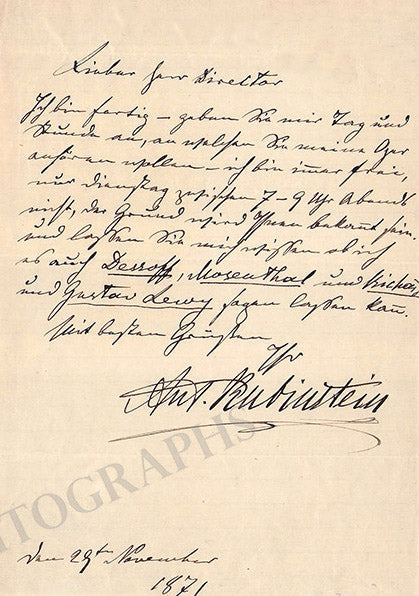Anton Rubinstein – Talented Pianist and Educator July 30 2021
WHEN AND WHERE WAS ANTON RUBINSTEIN BORN?
Anton Grigoryevich Rubinstein was born in a small village along the Dniester riveer on November 28, 1829 in the small trading port of Vikhvatinets, along the
Dniester River.
Bordered by Ukraine to the north, the region was part of the Russian Empire and is now part of the Republic of Moldova. Rubinstein’s parents were Jewish, but his paternal grandfather had the family convert to Russian Orthodoxy. He was raised Christian and later considered himself an atheist.
ANTON RUBINSTEIN FIRST PIANO LESSONS AND EARLY STUDIES
When Rubinstein was little, his mother gave him piano lessons. After overhearing Rubinstein’s playing abilities, a piano teacher agreed to take over the lessons for free.
At the age of nine, Rubinstein gave his first public appearance. It was a charity benefit concert and helped give young Rubinstein confidence in his skills.
A year later, his mother decided to send him to Paris in hopes that he would attend the Paris Conservatoire. The renowned school attracted top musicians and performers from around the world. Rubinstein left the small village near the river and arrived in Paris with his piano teacher.
Unfortunately, the Paris Conservatoire did not accept his admission.
RUBINSTEIN MEETS CHOPIN AND LISZT
While Rubinstein did not get into his school of choice, he did end up meeting two of the most well-known names in music at the time. Frederic Chopin and Franz Liszt were in the audience during a December 1840 performance at a small music venue in Paris.

After hearing Rubinstein play, Chopin invited the young pianist to his studio. Chopin and Liszt encouraged Rubinstein’s career as a pianist and recommended that he travel to Germany to work on his composition skills.
Instead of following their advice, Rubinstein’s piano teacher decided to take him on a tour of Europe and parts of Western Russia. For the next two and a half years, Rubinstein and his piano teacher traveled the region playing concerts.
They arrived back in Moscow in June 1843. The Rubinstein family did not stay in one place for too long. They spent the rest of the year touring Russia.
Anton Rubinstein and his younger brother Nikolai Rubinstein traveled with Rubinstein’s piano teacher. During their tour, Rubinstein played for Tsar Nicholas I at the Imperial family’s Winter Palace. Anton was only 14 years old at the time. In the spring of 1844, Rubinstein, his mother, and his siblings traveled to Berlin.
Rubinstein’s mother wanted the boys to work on music composition and theory. Through a series of referrals, Rubinstein and his brother began receiving instruction from Siegfried Dehn. Anton and Nikolai continued their studies for the next two years until the summer of 1846.
Rubinstein’s father had grown severely ill. The rest of the family returned to Russia while Rubinstein stayed in Berlin. At the age of 17, Rubinstein was ready to begin a professional career, as he knew that he could not tour as a child prodigy much longer. He traveled to Vienna to meet with Liszt in the hopes that the older pianist would mentor him. Liszt refused the request to teach Rubinstein and to offer any financial assistance.
Rubinstein was living in poverty and struggling to get by. To make ends meet, Rubinstein gave piano lessons and occasionally performed concerts. After about a year, he left Vienna and returned to Berlin.
RUBINSTEIN RISES FROM POVERTY TO PROMINENCE
Rubinstein stayed in Berlin until 1848 and the start of the
Revolutions of 1848. He traveled back to Russia and settled in Saint Petersburg. He spent the next five years in the city, giving more piano lessons and occasional concerts.
During this time, Rubinstein began performing at the Imperial Court more frequently. The Grand Duchess Elena Pavlovna became an important patron of Rubinstein’s, helping to increase his exposure. Rubinstein started devoting more time to composing. He composed many original works and solo piano pieces during this period, including his first opera.
In 1852, he performed Dmitry Donskoy at the Bolshoi Theater in Saint Petersburg. Along with the lengthy opera, he composed three one-set operas specifically for Duchess Pavlovna. However, his operas did not receive the acclaim that he expected.
He soon decided to travel abroad again to increase his reputation as a pianist and composer. In 1854, at the age of 24, Rubinstein embarked on a four-year tour of Europe. It was the first major tour for Rubinstein in about a decade. He was ready to present himself as an accomplished pianist and notable composer.
Most of the concerts included original compositions. At the time it was more common for composers to play their own compositions. He also switched back and forth between conducting the orchestra and joining it as a piano soloist.
Rubinstein wanted to be known for more than his piano work. He wanted people to recognize his compositions. He continued to compose, writing over 20 operas, five piano concertos, and six symphonies, plus many solo piano works.
Rubinstein’s compositions continued to receive mixed reviews and a generally warm response from critics. However, they frequently praised his playing abilities. Rubinstein was considered a virtuoso on the piano, effortlessly switching between graceful and powerful piano strokes.
The four-year tour of Europe was hectic, but Rubinstein allowed himself to take one extended break during the winter of 1856-1857. He spent the break with Duchess Pavlovna and the Imperial family in Nice. Rubinstein and Pavlovna spent much of the break discussing the need to improve musical education in Russia.
RUBINSTEIN OPENS THE SAINT PETERSBURG CONSERVATORY
Rubinstein continued his goal of promoting musical education by founding the Russian Musical Society (RMS). He opened the school with Grand Duchess Elena Pavlovna in 1859. It was the first music school open to the public in Russia. Classes were held in the Grand Duchess’s home and attracted students from all walks of life.
After the success of the RMS, Rubinstein’s brother Nikolai and Prince Nikolai Troubetzkoy founded a branch of the school in Moscow.
In 1862, Rubinstein opened the Saint Petersburg Conservatory. Unlike the RMS, the Saint Petersburg Conservatory was a dedicated music school and taught the theory of music in the Russian language.
Rubinstein established the school and remained as the director until 1867.
Due to growing disagreements with the faculty, he resigned from the conservatory and quickly started touring through Europe.
Rubinstein also found the time to continue composing. During his time at the school, he composed his Fourth Piano Concerto. Just before departing Europe for a tour of America, Rubinstein wrote what would become his most famous work – the Demon.
The above photograph shows an autograph letter by Rubinstein, mentioning this fantastic opera.
Between 1872 and 1873 he toured the United States. He performed 215 concerts over 239 days with a pay of 200 dollars per concert, which was unheard of at the time.
The tour was grueling and miserable but allowed Rubinstein to build his wealth. The income from several successful concert tours helped and supported him and his family throughout the rest of his life.
Rubinstein purchased a seasonal home in Peterhof, located just outside of Saint Petersburg. He resumed touring around Europe before returning to the St Petersburg Conservatory in 1887. Until 1887, Rubinstein maintained a fairly active concert schedule, both as a conductor and pianist.
The quality of the school’s standards had started to slip after his earlier departure. After resuming his position as director, Rubinstein fired various faculty, expelled inferior students, and updated the curriculum. He was very hands-on, leading several classes and giving weekly lecture-recitals.
THE FINAL YEARS OF ANTON RUBINSTEIN
In 1891, Rubinstein resigned from the conservatory for a second

time. He grew frustrated with the government’s demand that admittance and prizes be awarded based on ethnic quotas.
Many critics of the quotas claimed that they disadvantaged Jews. Photo shows a concert program with him, 1885.
After quitting, Rubinstein moved to Dresden, Germany. For the next few years, he occasionally gave performances at charity benefit events and coached one private piano student – Josef Hofmann.
Rubinstein traveled around Germany and Austria while sporadically returning to Russia to visit family and friends. His last concert was performed in Saint Petersburg on January 14, 1894.
Rubinstein´s health started to deteriorate, leading him to stop touring and return to his home in Peterhof. He spent his final moves in his home, dying of heart disease on November 20, 1894.
After Rubinstein´s departure, his works began to lose popularity, although his piano concerti remained in the repertoire in Europe until the First World War. His principal works have retained a toehold in the Russian repertoire.
THE LEGACY OF ANTON RUBINSTEIN
Rubinstein did not receive the recognition that he craved as a composer. However, during his lifetime and after Anton Rubinstein´s death, he was considered one of the most technically talented pianists of the nineteenth century.
He was known for his energetic performances. Many people compare Rubinstein’s playing style and appearance to Ludwig Van Beethoven, leading to the nickname “Van II”. Before playing a long portion of a song, Rubinstein would take a deep breath, allowing him to build to powerful crescendos.
Rubinstein’s devotion to music education is likely the biggest part of his legacy. The Saint Petersburg Conservatory continues to teach new generations of young pianists and musicians. In 2004, the school had over 1,400 students and remains open to the public to this day.
SEE ALSO:
- Rubinstein, Anton - Autograph Letter Signed 1871
- Die Maccabaer - Opera by Anton Rubinstein Playbill 1878
Interested in authentic autographs?




